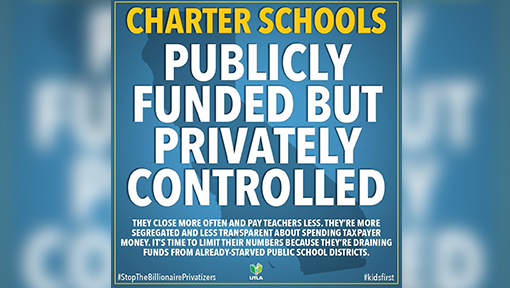There is no shortage of articles, books, reports, blogs, and websites that continually detail the perpetually scandalous and troubled nature of charter schools. Not a day goes by without a report on some sort of infamy, fraud, mismanagement, corruption, or failure in the unaccountable charter school sector.
But even articles and reports that are critical of charter schools often lapse into confused logic and arguments, revealing that the thinking around charter schools remains muddled.
This endless confusion and incoherence repeatedly conceals and renders forgettable the profound significance of the core feature of all charter schools: their inherently privatized nature.
As many have shown, charter schools are not public schools. Among other things, charter schools are not governed by elected officials, cannot levy taxes, reject many students, and have been deemed to be private entities by more than a few courts—all while receiving enormous sums of public money. In addition, thousands of charter schools perform poorly and many close every year, leaving thousands of families feeling abandoned, violated, and angry.
To some extent this damaging incoherence and confusion about charter schools is understandable because wealthy charter school advocates and their conscious and anti-conscious cheerleaders incessantly promote many myths, lies, and disinformation about charter schools in order to distort consciousness and disorient people. This makes it challenging to sort out important issues and figure out what is really going on. Myths, lies, and disinformation leave many people vulnerable to bogus ideas, arguments, views, and assertions.
Some of the most common false and diversionary dichotomies deployed by charter school supporters to perpetuate maximum confusion about charter schools include the following:
- regulated versus unregulated charter schools
- for-profit versus nonprofit charter schools
- good versus bad charter schools
- high-performing versus low-performing charter schools
- mom-and-pop versus corporate charter schools
- school district-approved versus “totally autonomous” charter schools
- well-funded versus poorly-funded charter schools
- no-excuses versus regular charter schools
- urban versus suburban charter schools
- small versus large charter schools
- online versus brick-and-mortar charter schools
- mission-driven versus “free market” oriented charter schools
Other harmful dichotomies designed to misdirect people down dangerous rabbit holes could be listed, but at the end of the day what matters most when discussing charter schools is not whether they are regulated or not, online or brick-and-mortar, for-profit or non-profit, arts-focused or science-themed. All charter schools, regardless of the many ways they differ in secondary characteristics, are essentially the same: they are all privatized, marketized, corporatized arrangements, and this key feature has always set charter schools apart from public schools.
False and diversionary dichotomies, and the distorted consciousness they produce, provide cover for the transfer of colossal sums of public money and public property from public school systems to wealthy private interests that own-operate-manage charter schools. It is not surprising that fraud and corruption saturate the non-transparent and segregated charter school sector.
Fortunately, even in this violent and chaotic context, there is broad and growing opposition to privately-operated non-profit and for-profit charter schools. In the coming months and years the quality of this opposition will become even better as the descriptions, exposures, and analyses of charter schools get better and stronger, leaving many charter school supporters more isolated and discredited. The privatization of K-12 schools has not solved a single problem confronting society and its members; it has just made some rich people and their entourage richer at the expense of kids.













